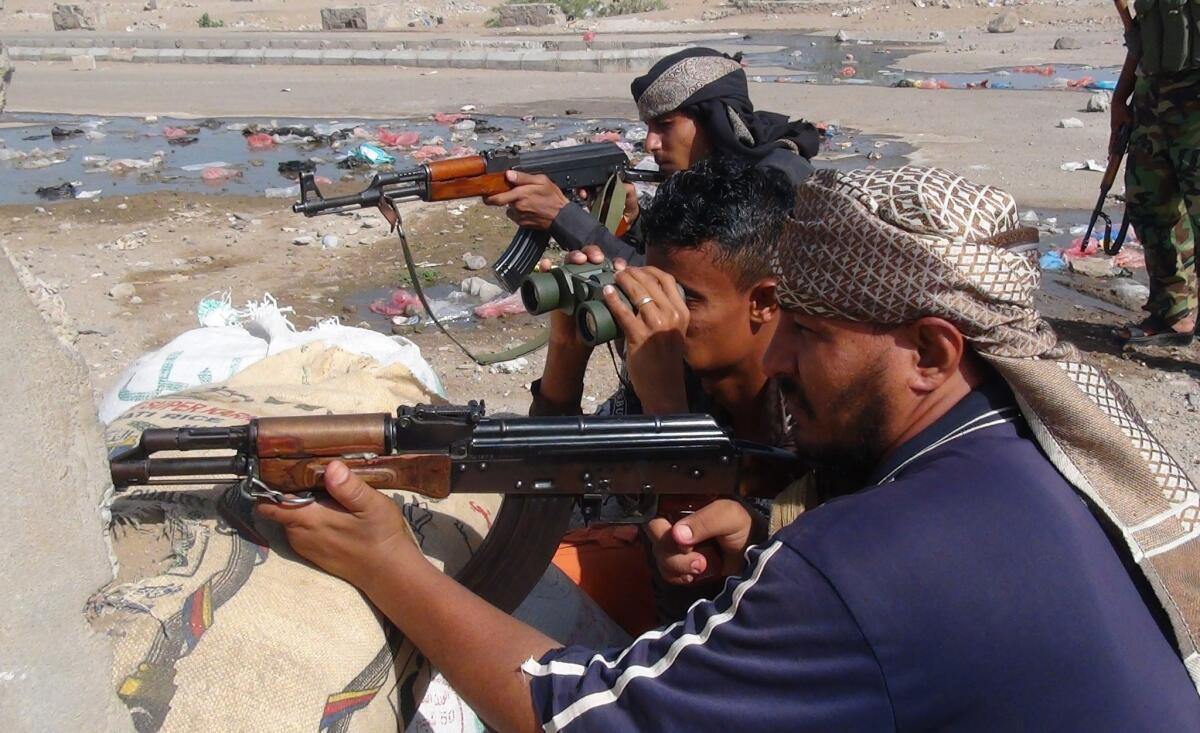With Russia abstaining, Security Council punishes Yemeni rebel leaders

Members of a Yemeni southern separatist movement keep position during reported clashes with Houthi rebels in a suburb of the port city of Aden on April 14.
- Share via
The United Nations Security Council voted Tuesday to impose an arms embargo on Yemen’s Iran-backed Houthi rebels in an attempt to quell violence that the world body’s envoy to the impoverished Middle East country has warned is on a “rapid downward spiral.”
The council’s emergency session vote was 14-0, with Russia abstaining in protest of that the resolution did not ban arms deliveries to all sides in the conflict.
The resolution also blacklisted Houthi leader Abdel-Malek Houthi, as well as Ahmed Ali Abdullah Saleh, the son of former Yemeni President Ali Abdullah Saleh. Soldiers loyal to the self-exiled former president, who stepped down in 2012, are accused of abetting the Houthi rebellion.
Russia’s ambassador to the United Nations, Vitaly Churkin, said after the vote that he had urged Jordan and the Arab Gulf states that sponsored the resolution to address the arms embargo to all parties and call upon them to “halt fire and to begin peace talks.”
“We insisted that the arms embargo needs to be comprehensive; it’s well known that Yemen is awash in weapons,” Churkin said in comments broadcast by Russia Today television. “The adopted resolution should not be used for further escalation of the armed conflict.”
Russia also had called unsuccessfully for a “humanitarian pause” in airstrikes, which a Saudi-led coalition of predominantly Sunni Muslim countries has been carrying out against the Shiite Muslim Houthi rebels since March 25.
Houthi rebels took control of the Yemeni capital, Sana, in September, unleashing sectarian bloodletting that has killed thousands of people and spread to the south, eventually driving President Abdu Rabu Mansour Hadi into exile. The Houthis are now pressing toward Aden, the southern stronghold to which Hadi had moved his deposed government and loyalist forces.
The U.N. resolution freezes the assets and imposes a travel ban on the Houthi leader and Saleh’s son. The Security Council in November imposed similar sanctions on Saleh, Houthi military commander Abd Khaliq Houthi and the rebels’ second-in-command, Abdullah Yahya Hakim.
Tuesday’s action followed a rare Sunday session in which the U.N. special advisor for Yemen, Jamal Benomar, warned of a rapidly deteriorating environment in the Middle East’s poorest country.
“Emotions are running extremely high and unless solutions can be found the country will fall into further violent confrontations,” Benomar said via a video conference call. “Events in Yemen are leading the country away from political settlement and to the edge of civil war.”
U.N. Secretary-General Ban Ki-moon a month ago warned that escalating violence has worsened a humanitarian crisis that afflicts “an astounding 61%” of the country of 26 million people. About one-third of the population is Shiite, including the Houthis, with the majority belonging to Sunni sects.
Coordinated suicide bombings at Sana mosques on March 20 killed at least 137 people, spurring a mass exodus of civilians and ensuing chaos in the southern regions to which many fled.
The rebels now control nine of Yemen’s 21 provinces.
Follow @cjwilliamsLAT on Twitter
More to Read
Sign up for Essential California
The most important California stories and recommendations in your inbox every morning.
You may occasionally receive promotional content from the Los Angeles Times.













